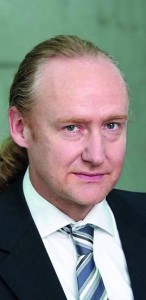 In this interview, Stefan Waschk, Head of the Agile Center of Excellence in Group IT at Volkswagen AG, talks about agile transformation in practice.
In this interview, Stefan Waschk, Head of the Agile Center of Excellence in Group IT at Volkswagen AG, talks about agile transformation in practice.
When did you start with Agile in the company?
In 2009, I was the manager responsible for a major project with many stakeholders and complex requirements. We introduced agile mechanisms because we realized that the creation of concepts was a bottleneck in the project and that the solutions implemented from these concepts were not satisfying our customers despite having been approved. At the time, my focus was initially on the improved controllability that agile project management methods promised. Self-organization of the teams was not so much in the foreground for me. I only realized how important a team with strong commitment was during the rollout. Today, I consider this aspect to be the most important for a successful agile approach.
What was the initial feedback back then?
The first release ensured a high level of satisfaction. Customers have noticed that they have to take more responsibility, which ultimately leads to an immense increase in quality. Our entire environment praises the high level of reliability after nine releases, which has resulted in a high level of acceptance and spread of agility within the company.
What stumbling blocks do you see for agile scaling and how did you overcome them?
The willingness of specialist departments and IT to invest in continuous collaboration so that learning is possible on the way to an innovative solution and to say goodbye to the pseudo-security of "perfect 100% planning". This created uncertainty for the customer and required a great deal of rethinking. Ultimately, however, we convinced everyone with our high level of reliability and the achievement of the agreed goals.
How were you able to recruit fellow campaigners?
As our project was running, other agilists quickly got in touch. A large network quickly developed with interested parties. Many tried it out bit by bit. We joined forces to "legalize" it - as a kind of "self-help group". (laughs) In the end, it was always the visible benefits that won us over.
Is agility a hype?
No, it's not hype, it's the next logical step in a reliable supply chain between customer and IT in which partnership is a top priority.
What convinced you to want to bring agility into the entire company?
Firstly, the topic of "efficiency of activities". I want to overcome the pseudo-reliability of classic planning and agile project management fits in very well with this. If you wanted to plan the high complexity of the projects at Volkswagen and the sharp increase in requirements during the project term, you would have to spend a very long time coming up with the perfect plan. And that would probably be overtaken by reality quite quickly. On the other hand, I am convinced of the agile principles, as the focus is on designing individual solutions for the customer.
What inspires me is the focus on the essentials - with an agile approach, development always takes place in line with current market and customer requirements. Volkswagen is huge and constantly growing. This naturally also increases complexity. In order to be able to react quickly to changes, remain agile and innovative and deal with increasing complexity, we need flexible and creative options throughout the company that we can shape ourselves. This is where agile transformation helps - each individual in the team takes responsibility instead of being just a "cog in the system".
Is agile "technical language" necessary or rather a hindrance?
Any technical language is initially a hindrance if you want to win over new teams or customers. But it is also a standardization with which you can quickly exchange ideas with other "trained" people. Old thinking often hinders lean effects - a new technical language ensures conscious new thinking.
What is your ideal image of an agile future?
We have a much stronger creative role, every individual is involved, all teams are empowered, the customer is firmly in the project team and the entire management is part of the agile value stream and ensures optimal framework conditions. The motto "Fail Fast" ensures a supportive error culture everywhere, which is essential for innovation.
What advice would you give today to your younger self who started with Agile back then?
Have the courage to ask questions and ask for help. Get experts involved right from the start. You can work it all out for yourself, but it goes much faster and better if you have support. The rules may be simple at first, but the implementation and the interpersonal aspects need to be worked out and moderated.
"OVER 60% OF THE PROJECTS THAT HAVE WEEKLY CUSTOMER CONTACT ARE SUCCESSFUL."
PM study by oose.
This text is taken from the wibas customer magazine.

Write a comment